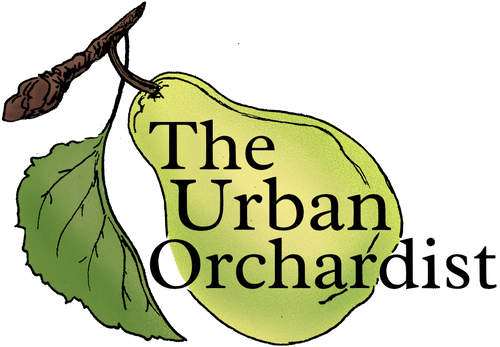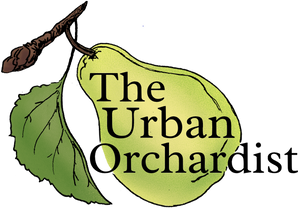The Urban Orchardist nursery is open for the spring 2026 planting season.
Use the Nursery drop-down menu at the top of the page to browse our catalogue, or read below for key information about how we operate.
The Urban Orchardist nursery is not a retail site for walk-in purchases (although this will change next year). You browse our inventory online (we go to great effort to write well-researched, high-quality descriptions, with accurate pictures from our own or others' orchards), you purchase online, and you receive your trees when they are dormant, in fall or early spring. We'll be in touch when we see your order and we can discuss any further questions you have.
Our nursery is in zone 6a (recently updated from 5b), just north of Guelph, Ontario. If you are planting in a significantly colder area (zone 4b or colder), or in a very exposed site, it may be best to plant in spring rather than fall. The trees will be better prepared for your winter after an additional season of growth in your bioregion. Contact us if you are unsure.
You can pay either at the time of ordering with an e-transfer or credit card, or, if you are local, you can pay at the time of pick-up with cash or cheque. E-transfers are great for a small business like mine because credit cards take a 3% cut, but please use whatever method works best for you.
Buy 5+ trees, get 5% off. Buy 10+ trees, get 10% off. Interested in more? Contact Matt@TheUrbanOrchardist.com to discuss.
- Pickup/delivery is in either November, or late-March/early-April, once the trees are fully dormant.
- If possible, picking up yourself is the cheapest option (its free). I organize pick-up days at Ignatius Farm just north of Guelph, where my nursery is located.
- Otherwise, I ship with Canada Post. Rates are automatically determined at checkout.
- For shipments, a $5 handling fee is automatically added to account for the cost of the box.
Bare root trees are dug and shipped while dormant, without soil around their roots (we pack them in damp sawdust to keep them hydrated during shipping). There are multiple benefits to this - bare root trees have less risk of transplant shock compared to potted trees, they are able to be shipped for a much cheaper price, and growing trees in the ground as opposed to pots is better for the trees, the grower, and the environment. If you'd like to read more, I like this article written by nurseryman Akiva Silver about The Benefits of Bare Root Trees.
Please note that some fruit trees require cross-pollination with a different variety of the same species to make fruit, and each variety's pollination requirement is listed in their description. Some of my trees are self-fertile (peaches, apricots, mulberries, sour cherries, some sweet cherries, and some plums). For the rest (apples, pears, some plums), a different variety of the same species in order to set fruit.
An apple and a pear can flower beside each other, but they won't pollinate each other and make fruit. Likewise, two Macoun apples can flower beside each other, but they won't make fruit either - they need to be two genetically different varieties of the same species. Just like with animals, inbreeding is discouraged - enforced outcrossing is evolution's way of ensuring a healthy gene pool.
My growing practices all fall within requirements of organic certification in Canada. I pay great attention to the ecosystem of the land, and use cover crops, good quality compost, and other amendments as an ongoing effort to build healthy soil and grow healthy trees. Where necessary for disease/pest management I use products certified for organic use rather than broad-spectrum synthetic products, and I hand-weed and mulch instead of using herbicides.

